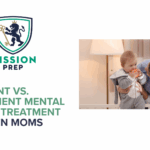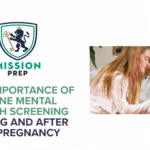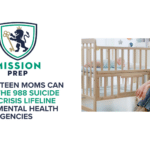Involving the Family: How to Create a Nurturing Environment for Pregnant Teens

US teen birth rates have declined substantially since the 1990s to reach record lows. This said, while teen pregnancy rates are dropping, pregnancies do still happen.¹ When a teen becomes pregnant, it doesn’t just change their life – it affects the whole family. Parents might feel unsure of what to say and siblings might not know how to act. There can be tension, silence, or just a sense that no one knows what comes next.
Teen parent family dynamics can be complex, but what matters most in these early moments is helping the teen feel safe and supported. Studies show that teens need strong social support networks, as well as practical tools, to help them overcome the barriers they may face.²
What’s more, when pregnant teens feel emotionally and practically supported by their families, they tend to face fewer medical complications and the baby has better outcomes, too.³ Still, many families feel unsure about how to offer that support in ways that truly help rather than overwhelm.
This guide walks you through the following aspects of how families can create a nurturing environment for pregnant teens:
- Why family support matters for pregnant teens
- Common barriers affecting family connection during teen pregnancy
- Practical ways families can create supportive environments for pregnant teens
- Navigating complicated family dynamics
- The role of family therapy during teen pregnancy
- How Mission Prep can help with creating a safe environment for pregnant teens

Teen Parent Family Dynamics: Why Family Support for Pregnant Teens Matters
Being a pregnant teen comes with both physical and emotional challenges. Even with support, many teens feel exposed, ashamed, anxious, and afraid of what’s coming next. Some worry about how their parents will see them. Others pull away from friends or shut down in the face of judgment. Many teens feel stigmatized by pregnancy and withdraw as a result.⁴
At this age, a teen’s brain development is still changing constantly, which makes it harder for them to regulate their emotions. As a result, their brains work differently when it comes to asking for help, making decisions, and solving problems.⁵ But just know this: The idea of becoming a parent – of giving birth, of being responsible – can be terrifying, even if they don’t say it out loud.
Family support for pregnant teens doesn’t have to come in the form of advice. In fact, the most helpful thing is often just being there and creating a safe space for teen mothers. Sitting beside them, listening without trying to fix anything, and letting them be scared. When a teen feels emotionally safe, they are more likely to stay grounded, and this steadiness can ripple into every part of pregnancy and their parenting journey.
Common Barriers to Family Connection During Teen Pregnancy
Teen pregnancy can affect families in multiple ways, sometimes creating emotional distance even in families that care deeply. When the news breaks, it’s not unusual for emotions to run high – research shows that parents often respond with anger, sadness, and disappointment initially.⁶ It can be a shock to the system. Siblings can feel left out or confused about their role. And the teen, often anticipating blame, might withdraw before anyone gets the chance to offer support.
Cultural values, family history, and personal beliefs about parenting often shape how people respond. Some studies suggest that teens with a sibling or parent who had a teenage pregnancy are more likely to have a teen pregnancy themselves.⁷ But there are also families where teen pregnancy comes out of the blue with no history of it in the family.
In some homes, the conversation stops altogether. In others, fear takes the lead – fear about the future, the child’s well-being, or what this change might mean for the family as a whole. These reactions often come from love but land as judgment, creating a sense of isolation for everyone involved – especially the teen mom.
However, it’s reassuring to know that even without perfect words, families can begin to rebuild trust. Research shows that, even when families struggle to accept a teen pregnancy to begin with, family relationships can become stronger as the focus shifts to the new baby. What’s more, despite their negative initial reactions, the parents of the teen mom (and often their romantic partner) step in to provide material, emotional, and practical support, so teen moms rarely have to do it all alone.⁶
Practical Ways of Families Guiding Teens Through Pregnancy and Creating a Supportive Environment
Support means more than being kind. It’s about showing up in ways that are consistent, respectful, and actually useful, especially when a teen is managing pregnancy and the road ahead feels uncertain. Here are a few key ways you can offer help:
1. Make Space for Honest Conversations
Create moments for emotional check-ins, not just updates about appointments or baby supplies. Ask how things are doing, and what feels heavy, confusing, or even exciting. Let those talks be low-pressure. You don’t need the perfect reply. Just being there, listening without fixing, is enough.
2. Connect Them to Therapy That Fits Their Needs
Teen pregnancy can undoubtedly be a challenging time for a teenager. And with this can come mental health problems like anxiety and depression.⁸ A therapist who understands teen development, pregnancy, or early parenting can help the teen build emotional tools, regulate stress, and prepare for co-parenting if needed. This provides support and offers skill-building opportunities. Studies also show that relevant programs or therapy can improve a teen parent’s education and lead to a decreased risk of repeat pregnancy.⁹
3. Help Them Stay Grounded in Who They Are
If they’re in school, keep them enrolled if possible. If they love art, music, or sports, find ways to keep those activities accessible.This ensures a teen doesn’t lose themselves during the process of pregnancy.
4. Involve Them in Decision-Making
Whether you’re discussing where the baby will sleep, who’ll help with nighttime feedings, or what kind of support the family can offer, make sure the teen’s voice is part of the conversation. This kind of respect builds confidence and trust.
5. Offer Help That Supports Independence
The aim of practical support is to help your teen while continuing to build their independence and respecting their autonomy. You can try:
- Giving rides to appointments, but letting them speak for themselves.
- Helping cook, while inviting them to join or choose what sounds good.
- Setting up shared calendars to keep track of classes or doctor visits.
6. Look for Peer Teen Pregnancy Support Groups
Teen moms often feel lonely, especially if they decide to live with their partner to rear their newborn. This is often because their partner has to work to provide for the child, and teen moms may pick up a lot of the childrearing responsibilities, with less support than if they continue to live with their families.⁶ Parents may also find talking to teens about pregnancy challenging, which can increase the isolation teen moms feel.
This is where support groups can be fundamental. Whether through local programs or online support groups, connection matters. Peer mentorship or group check-ins can help reduce shame and offer perspective, especially when things feel isolating.10 If you’re looking for the right support network for young moms, Mission Prep can help.
7. Support Co-Parenting if It’s Part of the Picture
If the other parent is around, make space for their involvement (if it’s in the child’s best interest to do so). Classes in newborn care or shared counseling sessions can teach both teens how to communicate better and share responsibilities with less tension.
These steps aren’t complicated, but they do take patience and intention. Over time, they help build a sense of safety, belonging, and readiness that matters more than any single conversation.
When Family Dynamics Are Complicated: Tackling Conflict and Strain
The success of a healthy teen pregnancy and home environment are interlinked. Not every teen has a steady home to fall back on. For some, pregnancy happens right in the middle of family tension, where talking feels risky, emotions run hot, and connection feels like a closed door.
When there’s conflict at home, it’s easy for the teen to feel shut down before they even speak. They might already be carrying guilt, fear, or shame. And when that’s met with silence, criticism, or control, it doesn’t take much for them to retreat entirely.
If a full family repair feels out of reach, it doesn’t mean all hope is lost. What helps most is consistency. Continue to show up by checking in without an agenda, showing up to a doctor’s visit, and sitting quietly in the same room. Being a consistent figure in a teen mom’s life can create enough emotional grounding to shift things.
Outside support matters, too. A school counselor, mentor, or extended family member can help fill gaps when the primary home environment feels fragile. Therapy can also make space for better tools, especially when it focuses on boundaries, communication, or co-parenting dynamics.
The Role of Family Therapy in Strengthening Support
When a teenager is expecting a baby, family therapy can provide a space for open conversation, better understanding, and emotional grounding. Providing support systems for teen moms is not about having perfect communication or solving everything at once, but more about making room for real feelings, honest questions, and shared support that actually helps the teen and their growing family.
Here’s how family therapy can make a difference:
Aside from these communication skills, coparenting for teen parent resources can also help create a greater sense of stability through the following techniques.
Easing Family Tension
Pregnancy can bring stress, and sometimes that stress shows up as conflict with family and friends who may be angry and disappointed. 11 Family therapy gives everyone a place to talk through what’s been said, what hasn’t been said, and how those things affect connection. When people feel heard it gets easier to show up for each other.
Getting Ready for Parenthood
Therapists can guide families through conversations about parenting values, daily responsibilities, and how to support a teen as they step into this new role. Instead of guessing what each person expects, family therapy aims to improve the well-being of the parents and prepare them for parenthood while addressing the needs of the parents.¹²
Improving Communication
Family therapy during teen pregnancy focuses on communication and strategies for developing family relationships.¹³ Therapy teaches families how to speak clearly without blame, listen without interruption, and respond without shutting down. These are tools to rebuild trust and help with nurturing relationships during pregnancy.
Recognizing and Using Support Networks
Support systems for teen moms don’t have to come from just one place. Therapy can help families identify the relationships and resources that already exist in the form of extended relatives, friends, and community groups, and learn how to lean on them in healthy ways.
Helping Teens During Pregnancy by Prioritizing Mental Health
Teen mental health and family involvement go hand-in-hand. Being pregnant as a teen can come with emotional challenges. Anxiety, sadness, and overwhelm are all common. Therapy helps name what’s happening and introduces ways to manage it through conversation, behavior strategies, and finding additional support when needed.
Helping Teens During Pregnancy with Co-parenting Strategies
Studies suggest that in situations where teen co-parents have conflict, their child often develop behavioral and social challenges.14 In situations where the teen will be sharing parenting with someone else, therapy can help create structure. It’s a place to talk about boundaries, roles, and what kind of teamwork will give the baby the best start. It can also help family members understand why keeping both parents involved matters for the child.

Reach Out to Mission Prep for Family Counseling for Teen Pregnancy and Family-Based Mental Health Support
At Mission Prep, we understand that this journey brings more than just medical needs. It brings emotional challenges, shifting roles, and the need for steady support. This is why our family counseling for teen pregnancy is designed not only for teens but for the people around them, too.
We use approaches like cognitive behavioral therapy, trauma-informed care, interpersonal therapy, and mindfulness. Whether it’s helping a teen manage anxiety, giving caregivers space to voice their fears, or offering parent resources for pregnant teenagers, our goal is to create a space where everyone feels heard and supported.
We also help teens manage the mental health side of pregnancy by offering therapy for anxiety, depression, and trauma. Families receive guidance on co-parenting, support during postpartum transitions, and help reconnecting with school or peer life when everything feels in flux.
To explore more, see our guides on teen pregnancy and trauma, mental health treatment options, co-parenting support, and peer groups for pregnant teens. Contact us via phone call today.
References
- Kappeler, E. M. (2015). Adolescent health and teen pregnancy in the United States: A progress report. Public Health Reports, 130(3), 196–198. https://pmc.ncbi.nlm.nih.gov/articles/PMC4388214/
- O’Brien Cherry, C., Chumbler, N., Bute, J., & Huff, A. (2015). Building a “better life”: The transformative effects of adolescent pregnancy and parenting. SAGE Open, 5(1). https://journals.sagepub.com/doi/10.1177/2158244015571638
- Turner, R. J., Grindstaff, C. F., & Phillips, N. (1990). Social support and outcome in teenage pregnancy. Journal of Health and Social Behavior, 31(1), 43–57. https://www.jstor.org/stable/2137044
- Wiemann, C. M., Rickert, V. I., Berenson, A. B., & Volk, R. J. (2005). Are pregnant adolescents stigmatized by pregnancy? The Journal of Adolescent Health: Official Publication of the Society for Adolescent Medicine, 36(4), 352.e1–352.e8. https://pubmed.ncbi.nlm.nih.gov/15780793/
- AACAP. (n.d.). Teen brain: Behavior, problem solving, and decision making. Aacap.org. Retrieved June 11, 2025, from https://www.aacap.org/AACAP/Families_and_Youth/Facts_for_Families/FFF-Guide/The-Teen-Brain-Behavior-Problem-Solving-and-Decision-Making-095.aspx
- Sámano, R., Martínez-Rojano, H., Robichaux, D., Rodríguez-Ventura, A. L., Sánchez-Jiménez, B., De La Luz Hoyuela, M., Godínez, E., & Segovia, S. (2017). Family context and individual situation of teens before, during and after pregnancy in Mexico City. BMC Pregnancy and Childbirth, 17(1). https://doi.org/10.1186/s12884-017-1570-7
- East, P. L., Reyes, B. T., & Horn, E. J. (2007). Association between adolescent pregnancy and a family history of teenage births. Perspectives on Sexual and Reproductive Health, 39(2), 108–115. https://pmc.ncbi.nlm.nih.gov/articles/PMC3766634/
- Hodgkinson, S., Beers, L., Southammakosane, C., & Lewin, A. (2014). Addressing the mental health needs of pregnant and parenting adolescents. Pediatrics, 133(1), 114–122. https://pmc.ncbi.nlm.nih.gov/articles/PMC3876179/
- Harding, J. F., Knab, J., Zief, S., Kelly, K., & McCallum, D. (2020). A systematic review of programs to promote aspects of teen parents’ self-sufficiency: Supporting educational outcomes and healthy birth spacing. Maternal and Child Health Journal, 24(Suppl 2), 84–104. https://pmc.ncbi.nlm.nih.gov/articles/PMC7497377/
- Bunting, L., & McAuley, C. (2004). Teenage pregnancy and motherhood: The contribution of support. Child & Family Social Work, 9(2), 207–215. https://www.researchgate.net/publication/313155880_Teenage_pregnancy_and_motherhood_the_contribution_of_support
- Ntshayintshayi, P. N., Sehularo, L. A., Mokgaola, I. O., & Sepeng, N. V. (2022). Exploring the psychosocial challenges faced by pregnant teenagers in Ditsobotla subdistrict. Health SA Gesondheid, 27, 1880. https://pmc.ncbi.nlm.nih.gov/articles/PMC9724101/
- Kuhn, E. S., & Laird, R. D. (2014). Family support programs and adolescent mental health: review of evidence. Adolescent Health, Medicine and Therapeutics, 5, 127–142. https://pmc.ncbi.nlm.nih.gov/articles/PMC4096456/
- Bluestein, D., & Starling, M. E. (1994). Helping pregnant teenagers. The Western Journal of Medicine, 161(2), 140–143. https://pubmed.ncbi.nlm.nih.gov/7941531/#:~:text=Abstract,patience%2C%20and%20a%20nonjudgmental%20attitude
- Lewin, A., Mitchell, S. J., Beers, L. S., Feinberg, M. E., & Minkovitz, C. S. (2012). Coparenting in teen mothers and their children’s fathers: Evidence from the Early Childhood Longitudinal Study–Birth Cohort. Academic Pediatrics, 12(6), 539–545. https://www.sciencedirect.com/science/article/abs/pii/S1876285912001994



















